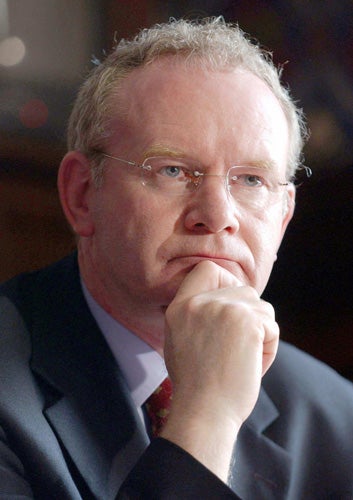IRA ruling Army Council may be disbanded

Your support helps us to tell the story
From reproductive rights to climate change to Big Tech, The Independent is on the ground when the story is developing. Whether it's investigating the financials of Elon Musk's pro-Trump PAC or producing our latest documentary, 'The A Word', which shines a light on the American women fighting for reproductive rights, we know how important it is to parse out the facts from the messaging.
At such a critical moment in US history, we need reporters on the ground. Your donation allows us to keep sending journalists to speak to both sides of the story.
The Independent is trusted by Americans across the entire political spectrum. And unlike many other quality news outlets, we choose not to lock Americans out of our reporting and analysis with paywalls. We believe quality journalism should be available to everyone, paid for by those who can afford it.
Your support makes all the difference.Martin McGuinness is to enter into talks with Peter Robinson, the Northern Ireland First Minister, about disbanding the IRA's ruling army council, in an attempt to break the province's political deadlock.
The continued existence of the council is at the centre of mounting political disagreement holding up the transfer of policing powers from Westminster to Northern Ireland.
The Democratic Unionist Party (DUP), led by Mr Robinson, insists that it will not approve the devolution of policing and security powers to Belfast while the army council remains in being. Sinn Fein, which is a member of the coalition headed by the DUP, wants security devolution first.
Following publication of an official report on the IRA army council today, the two parties are to engage in a series of meetings aimed at bridging the gap between them on this and other issues.
There is widespread agreement that the IRA as an organisation has ceased to function and poses no security threat, but disbandment remains a key political sticking point.
The Independent Monitoring Commission is expected to report today that the council no longer functions as a military leadership and is a non-threatening remnant of an organisation which has in effect melted away. The security forces on both sides of the border share this assessment, and have been relaxed about the council's continuing existence.
But the question is much more significant politically than militarily, since it is a key element in a political mosaic involving Sinn Fein and the DUP, led by the Rev Ian Paisley until June but which is now led by Mr Robinson.
Mr Robinson, who yesterday met Chief Constable Sir Hugh Orde, of the Police Service of Northern Ireland, to discuss the IRA, said afterwards: "I think he recognises that some parts of the structure are still there. But they are not being used, according to the Chief Constable, for any paramilitary or terrorist purpose.
"We still take the position that the structures must be removed completely. There is no purpose of having a structure if you do not intend to operate in a paramilitary fashion."
Sinn Fein's position is that there should first be a speedy transfer of policing and justice powers to the Belfast assembly, which already controls areas such as trade, agriculture and education. The DUP argues that this should await confirmation that the entire IRA, including the army council, has gone completely. The loyalists and republicans also disagree on lesser issues such as the position of the Irish language, education reform, and the redevelopment of the former Maze prison.
The DUP and Sinn Fein recently agreed that neither of them should take the justice and policing portfolio when it is eventually transferred to Belfast.
However, other than that, little appreciable progress on any of the issues was made during a summer when hardly any political activity was evident. The expectation now is that the pace will quicken this month, with efforts made to sort out the various difficulties.
There is speculation that Mr Robinson, as a new and untried leader, is concerned to guard against criticisms from a small but vociferous section of loyalists opposed to the political settlement. Its most prominent spokesman, Jim Allister, a European MP and ex-DUP member, has made the removal of the council a foremost demand.
Republicans, for their part, are not adamantly opposed to its departure. The speculation is that they may be retaining it, for the moment, for use as a bargaining chip in the negotiations ahead.
Join our commenting forum
Join thought-provoking conversations, follow other Independent readers and see their replies
Comments